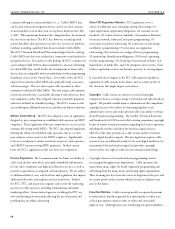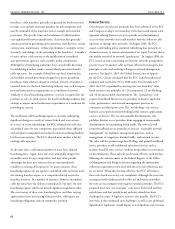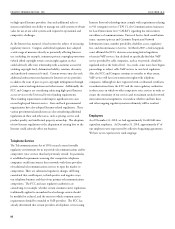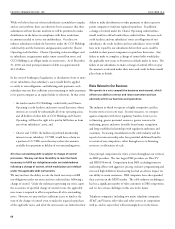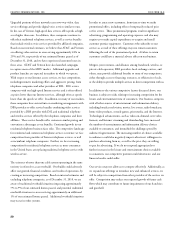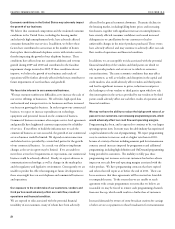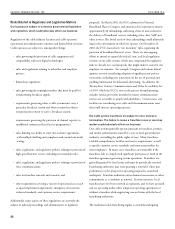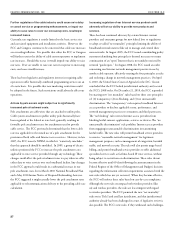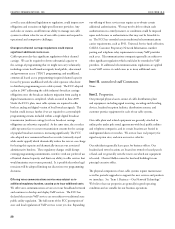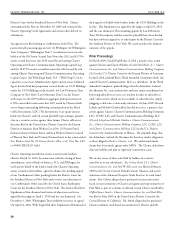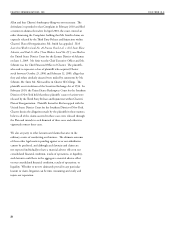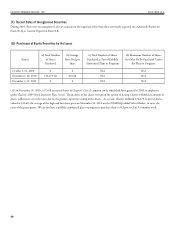Charter 2010 Annual Report Download - page 37
Download and view the complete annual report
Please find page 37 of the 2010 Charter annual report below. You can navigate through the pages in the report by either clicking on the pages listed below, or by using the keyword search tool below to find specific information within the annual report.
adversely by the competitive environment for management talent
in the telecommunications industry. e loss of the services of key
members of management and the inability to hire new key employees
could adversely affect our ability to manage our business and our
future operational and financial results.
Charter’s principal stockholders own a signicant amount of
Charter’s common stock, giving them inuence over corporate
transactions and other matters.
Charter’s principal stockholders have appointed members to Charter’s
board of directors in accordance with the Plan, including: Mr.
Darren Glatt, who is an employee of Apollo Management, L.P.; and
Mr. Bruce Karsh, who was appointed by Oaktree Opportunities
Investments, L.P. and is the president of Oaktree Capital
Management, L.P. On January 18, 2011, Charter’s board of directors
appointed Mr. Stan Parker, a senior partner of Apollo Global
Management LLC, and Mr. Edgar Lee, a Senior Vice President
of Oaktree Capital Management, L.P. as members of the board
of directors to fill two vacancies on the board. As of January 31,
2011, funds affiliated with AP Charter Holdings, L.P. beneficially
hold approximately 31% of the Class A common stock of Charter.
Oaktree Opportunities Investments, L.P. and certain affiliated funds
beneficially hold approximately 18% of the Class A common stock
of Charter. Funds advised by Franklin Advisers, Inc. beneficially
hold approximately 17% of the Class A common stock of Charter.
Charter’s principal stockholders may be able to exercise substantial
influence over all matters requiring stockholder approval, including
the election of directors and approval of significant corporate action,
such as mergers and other business combination transactions should
these stockholders retain a significant ownership interest in us.
Charter’s principal stockholders are not restricted from investing
in, and have invested in, and engaged in, other businesses involving
or related to the operation of cable television systems, video
programming, high-speed Internet service, telephone or business and
financial transactions conducted through broadband interactivity
and Internet services. e principal stockholders may also engage in
other businesses that compete or may in the future compete with us.
e principal stockholders’ substantial influence over our
management and affairs could create conflicts of interest if any of
them were faced with decisions that could have different implications
for them and us.
If we were to have a person with a 35% or greater voting interest
and Paul G. Allen did not then have a voting interest in us greater
than such holder, a change of control default could be triggered
under our subsidiary's credit facilities.
On March 31, 2010, Charter Operating entered into an amended
and restated credit agreement governing its credit facility. Such
amendment removed the requirement that Mr. Allen retain a voting
interest in us. On January 18, 2011, Mr. Allen’s Class B shares were
converted to Class A shares, and as a result, Mr. Allen currently
holds less than 10% of a voting interest in us. e credit agreement
provides that a change of control under certain of our other debt
instruments could result in an event of default under the credit
agreement. Certain of those other instruments define a change of
control as including a holder holding more than 35% of our direct
or indirect voting interest and the failure by (a) Mr. Allen, (b) his
estate, spouse, immediate family members and heirs and (c) any
trust, corporation, partnership or other entity, the beneficiaries,
stockholders, partners or other owners of which consist exclusively
of Mr. Allen or such other persons referred to in (b) above or a
combination thereof to maintain a greater percentage of direct or
indirect voting interest than such other holder. Such a default could
result in the acceleration of repayment of our indebtedness, including
borrowings under the Charter Operating credit facilities. As of
January 31, 2011, funds affiliated with AP Charter Holdings, L.P.
beneficially hold approximately 31% of the Class A common stock
of Charter. See “— Risks Related to Our Significant Indebtedness
and the Notes—All of our outstanding debt is subject to change of
control provisions. We may not have the ability to raise the funds
necessary to fulfill our obligations under our indebtedness following
a change of control, which would place us in default under the
applicable debt instruments.”


